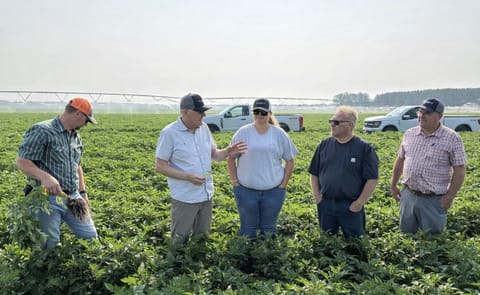National Fry Processor Trials identify lower acrylamide clones
Primaire tabs
National Fry Processor Trials identify lower acrylamide clones

The first acrylamide test results have become available from the Washington and Idaho National Fry Processor Trials (NFPT). The trials are being processed in the order in which they were harvested, with Washington first, followed by Idaho, then North Dakota.
Acrylamide information is being collected from finished fries processed at the USDA lab in East Grand Forks, MN and then sent to the laboratory of Mike Pariza and Jayne Stockton at the University of Wisconsin/Madison.
All 81 clones in the two trials were analyzed for their respective acrylamide levels. Ranger and Burbank represented the check varieties for all trials and analysis.
The Washington clones had an average acrylamide level of 262 ug/kg. Idaho had an average level of 385 ug/kg. (NOTE: ug/kg = ppb)
In Washington, Ranger Russet had an acrylamide level of 480 ug/kg, while Russet Burbank had an acrylamide level of 475 ug/kg. In Idaho, Ranger Russet had an acrylamide level of 568 ug/kg, while Russet Burbank has an acrylamide level of 1,388 ug/kg.
Washington Trial Key Observations:
Kathy Haynes, USDA/ARS, has been contacted to conduct the analysis of the data the NFPT trials are generating. We have asked Kathy to provide us with analysis for drawing conclusions from our data, correlations between asparagine, acrylamide and sugars and helping us determine which clones we should continue to test going forward.
Acrylamide information is being collected from finished fries processed at the USDA lab in East Grand Forks, MN and then sent to the laboratory of Mike Pariza and Jayne Stockton at the University of Wisconsin/Madison.
All 81 clones in the two trials were analyzed for their respective acrylamide levels. Ranger and Burbank represented the check varieties for all trials and analysis.
The Washington clones had an average acrylamide level of 262 ug/kg. Idaho had an average level of 385 ug/kg. (NOTE: ug/kg = ppb)
In Washington, Ranger Russet had an acrylamide level of 480 ug/kg, while Russet Burbank had an acrylamide level of 475 ug/kg. In Idaho, Ranger Russet had an acrylamide level of 568 ug/kg, while Russet Burbank has an acrylamide level of 1,388 ug/kg.
Washington Trial Key Observations:
- Five (5) clones had acrylamide levels under 100 ug/kg
- 32 clones had acrylamide levels under 200 ug/kg
- All but five (5) clones had lower levels of acrylamide than Ranger and Burbank
- Premier Russet’s acrylamide level was 238 ug/kg
- No clones had acrylamide levels under 100 ug/kg
- 10 clones had acrylamide levels under 200 ug/kg
- All but nine (9) clones had lower levels of acrylamide than Ranger’s
- Burbank had higher levels of acrylamide than any other clone
Kathy Haynes, USDA/ARS, has been contacted to conduct the analysis of the data the NFPT trials are generating. We have asked Kathy to provide us with analysis for drawing conclusions from our data, correlations between asparagine, acrylamide and sugars and helping us determine which clones we should continue to test going forward.
Like to receive news like this by email? Join and Subscribe!
Get the latest potato industry news straight to your WhatsApp. Join the PotatoPro WhatsApp Community!
Sponsored Content
Sponsored Content
Sponsored Content
Sponsored Content










